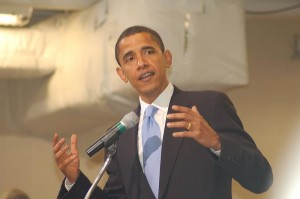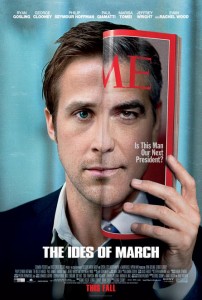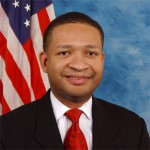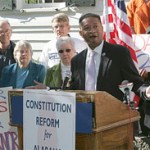By Artur Davis, on Wed Nov 2, 2011 at 8:30 AM ET
 The Democratic Party has a faith gap–and if anything it is getting wider. The Gallup Poll has just released data showing a chasm between the political leanings of self-described “very religious” whites, with 62% identifying themselves as Republicans and a scarce 27% identifying as Republicans. At this point, no other demographic skews more heavily toward Republicans than faith oriented whites, and the electoral consequences are unmistakable: it correlates almost evenly with the overwhelmingly Republican preferences of southern whites, who are the most religious whites in America, and further defines why a slew of states with large blocs of evangelical leaning whites are drifting away from Barack Obama, from Ohio to Virginia, to Florida, to Indiana, to Colorado. The Democratic Party has a faith gap–and if anything it is getting wider. The Gallup Poll has just released data showing a chasm between the political leanings of self-described “very religious” whites, with 62% identifying themselves as Republicans and a scarce 27% identifying as Republicans. At this point, no other demographic skews more heavily toward Republicans than faith oriented whites, and the electoral consequences are unmistakable: it correlates almost evenly with the overwhelmingly Republican preferences of southern whites, who are the most religious whites in America, and further defines why a slew of states with large blocs of evangelical leaning whites are drifting away from Barack Obama, from Ohio to Virginia, to Florida, to Indiana, to Colorado.
There is a mindset in some Democratic circles that religious whites are disproportionately economic conservatives who are natural Tea Party sympathizers. While Gallup did not test specific issues, I have seen a slew of polling data from Alabama–a top two ranked state in football and religiosity–that shows religious whites are often economic populists, distrust corporate elites, don’t mind putting more taxes on those elites, and that surprising shares of them embrace the notion of more government spending on education and, yes, safety nets like Medicaid. They are proud, church-going denizens of the 99 percent, in Occupy Wall Street parlance.
But if the economic lean of religious whites is surprisingly to the left, their stance on social issues leans hard in the other direction. The Public Religion Research Institute recently found that in a country where voters are sharply split on abortion, only 29% of “evangelical” whites favor its legalization, while almost two thirds oppose. Similarly, on same sex marriage, which elite opinion now conclusively favors, and on which the public is split in half, over 80% of white evangelicals oppose legalizing gay marriage.
 So, in practice, religious whites have voted their sectarian leanings over their economic tendencies. Breaking that pattern was until recently a major Democratic preoccupation. A succession of Democratic thinkers, most notably Jim Wallis, tried to pry the door open by re-casting liberal policies on healthcare, poverty, and educational access as faith-based priorities, grounded in Matthew’s New Testament admonition to advance the interests of the “least of these”. Barack Obama’s keynote address in 2004 sounded an eloquent note that “in the blue states, we worship an awesome God and in the red states, we have some gay friends.” In 2005, Obama’s first high profile speech as a Senator linked his political vision to his faith and its promises of a more seamless community, and during the years of Obama’s rise, there seemed to be a genuine affinity between he and Rick Warren, the avatar of the “purpose driven life” and an evangelical icon. So, in practice, religious whites have voted their sectarian leanings over their economic tendencies. Breaking that pattern was until recently a major Democratic preoccupation. A succession of Democratic thinkers, most notably Jim Wallis, tried to pry the door open by re-casting liberal policies on healthcare, poverty, and educational access as faith-based priorities, grounded in Matthew’s New Testament admonition to advance the interests of the “least of these”. Barack Obama’s keynote address in 2004 sounded an eloquent note that “in the blue states, we worship an awesome God and in the red states, we have some gay friends.” In 2005, Obama’s first high profile speech as a Senator linked his political vision to his faith and its promises of a more seamless community, and during the years of Obama’s rise, there seemed to be a genuine affinity between he and Rick Warren, the avatar of the “purpose driven life” and an evangelical icon.
Read the rest of…
Artur Davis: The Democratic Party’s Faith Gap
By Artur Davis, on Tue Nov 1, 2011 at 8:30 AM ET Can a candidate survive allegations that are roughly 15 years old, that are apparently not corroborated, and that resulted in relatively small settlements with his organization?
Probably, but there are a catalogue of ifs: if he is straightforward and composed in his denial of the claims of harassment; if the women don’t come forward and put a compelling face on the charges, and if this is not just the tip of the iceberg around claims as to how he treats women under his supervision.
In other words, this really falls on Herman Cain: does he have grace under fire and what kind of man, and boss, has he been? The Cain team needs to study up on some recent history: how effectively the McCain campaign handled a New York Times story hinting at his infidelity with a lobbyist, and how Gov. Nikki Haley fended off even more lurid allegations in South Carolina last year.
McCain and Haley both understood that the Republican base distrusts these kinds of blows as a political hit job, and Cain is already stoking the same flames.
Finally, it should also be said that for a candidate whose ceiling was already about where he is today, “survival” is a relative term.
(Cross-posted, with permission of the author, from Politico’s Arena.)
By Artur Davis, on Thu Oct 27, 2011 at 8:30 AM ET  Occupy Wall Street is the latest proof that populism is not a purely conservative phenomenon; instead, populism of the left or the right distrusts government as a bribed, compromised institution, and rejects consensus as a political tactic. For liberals who envy the conservative skill at converting protest movements into a sustained political force, and who want to create a left -leaning enforcer within the Democratic Party, OWS is the answer to a fantasy. Occupy Wall Street is the latest proof that populism is not a purely conservative phenomenon; instead, populism of the left or the right distrusts government as a bribed, compromised institution, and rejects consensus as a political tactic. For liberals who envy the conservative skill at converting protest movements into a sustained political force, and who want to create a left -leaning enforcer within the Democratic Party, OWS is the answer to a fantasy.
However, for Barack Obama, OWS happens to be the polar opposite of what he campaigned on as well as the message that launched him at the convention in Boston in 2004. Its “us versus them” mantra has made Wall Street its target, but its ultimate result would be a politics that is conflict-driven, divided, and bitterly conscious of the line between a “red” and a “blue” America. Obama should hear the anger in these protests, but he should recognize that it is poised to join the tea party as one more force that is pulling us apart.
Cross-posted, with permission of the author, from Politico’s Arena.
By Artur Davis, on Mon Oct 24, 2011 at 12:00 PM ET  Yes, the CLASS program is a narrow feature of Obamacare that most Americans knew nothing about. Yes, the CLASS program is a narrow feature of Obamacare that most Americans knew nothing about.
But scrapping the program validates some of the central critiques of health care reform – that it is overly complex, is unsustainable financially, and is too experimental and bureaucratic. And none this is hindsight – it is exactly what critics of the law argued would happen if the White House insisted on a systems overhaul of health are rather than a targeted attack on pre-existing illness exclusions and a federally-funded expansion of Medicaid.
 The travails of the CLASS program also illustrate the degree to which congressional Democrats and private sector interests inserted a backlog of frustrated policy goals into the fine print of “Obamacare.” Hill staffers who were distrustful of the efficacy of the private insurance market fixated on CLASS as an eventual wedge into a “public option”, and in private meetings made no bones about their thinking. The travails of the CLASS program also illustrate the degree to which congressional Democrats and private sector interests inserted a backlog of frustrated policy goals into the fine print of “Obamacare.” Hill staffers who were distrustful of the efficacy of the private insurance market fixated on CLASS as an eventual wedge into a “public option”, and in private meetings made no bones about their thinking.
Read the rest of…
Artur Davis: Is Obamacare Crumbling?
By Artur Davis, on Fri Oct 21, 2011 at 11:30 AM ET The Internet tubes are abuzz over a highly controversial op-ed piece penned by contributing RP and former Alabama Congressman Artur Davis in the Montgomery Advertiser. As you can read below, Davis has changed his mind from formerly opposing a voter identification law in his home state. As always, we encourage a healthy debate, and your opinions are welcome in the comments section below:
 I’ve changed my mind on voter ID laws — I think Alabama did the right thing in passing one — and I wish I had gotten it right when I was in political office. I’ve changed my mind on voter ID laws — I think Alabama did the right thing in passing one — and I wish I had gotten it right when I was in political office.
When I was a congressman, I took the path of least resistance on this subject for an African American politician. Without any evidence to back it up, I lapsed into the rhetoric of various partisans and activists who contend that requiring photo identification to vote is a suppression tactic aimed at thwarting black voter participation.
The truth is that the most aggressive contemporary voter suppression in the African American community, at least in Alabama, is the wholesale manufacture of ballots, at the polls and absentee, in parts of the Black Belt.
 Voting the names of the dead, and the nonexistent, and the too-mentally-impaired to function, cancels out the votes of citizens who are exercising their rights — that’s suppression by any light. If you doubt it exists, I don’t; I’ve heard the peddlers of these ballots brag about it, I’ve been asked to provide the funds for it, and I am confident it has changed at least a few close local election results. Voting the names of the dead, and the nonexistent, and the too-mentally-impaired to function, cancels out the votes of citizens who are exercising their rights — that’s suppression by any light. If you doubt it exists, I don’t; I’ve heard the peddlers of these ballots brag about it, I’ve been asked to provide the funds for it, and I am confident it has changed at least a few close local election results.
There is no question that a voter ID law, in order to pass legal muster and in order to be just, must have certain characteristics. It should contain exceptions for the elderly or disabled who may not drive, and as a consequence lack the most conventional ID, a driver’s license. There should also be a process for non-drivers to obtain a photo ID, and the process has to be cost-free, for the simple reason that even a nominal financial impediment to voting looks and feels too much like a poll tax.
It is my understanding that the Alabama statute contains each of these exceptions and a few others, including a provision for on-site polling officials to waive the requirement if they attest that they know the voter.
The fact that a law that is unlikely to impede a single good faith voter — and that only gives voting the same elements of security as writing a check at the store, or obtaining a library card — is controversial does say much about the raw feelings in our current politics. The ugliest, hardest forms of disfranchisement were practiced in our lifetimes, and its still conventional rhetoric in black political circles to say those times are on the way back. Witness a last-minute automated call to black voters in the 2010 general election by state Sen. Hank Sanders, an ingenious lawyer and a skillful legislator who knew better, but who also knew the attack would resonate.
Read the rest of…
Artur Davis: I Should Have Supported Voter ID Law
By Artur Davis, on Fri Oct 14, 2011 at 8:30 AM ET  Let’s begin with what “The Ides of March” won’t be: it will contend for no Oscars, it does not threaten the exclusive club status of “All the President’s Men” or “Primary Colors”, and it lacks the camp appeal of “W.” It is, however, the latest cinematic attempt to demonstrate that the past-time of people like us is actually kind of watchable, and interesting, and if we selfishly want to see more of our dreamworld being glamorized, our kind should care if this sort of thing still makes good movies. Let’s begin with what “The Ides of March” won’t be: it will contend for no Oscars, it does not threaten the exclusive club status of “All the President’s Men” or “Primary Colors”, and it lacks the camp appeal of “W.” It is, however, the latest cinematic attempt to demonstrate that the past-time of people like us is actually kind of watchable, and interesting, and if we selfishly want to see more of our dreamworld being glamorized, our kind should care if this sort of thing still makes good movies.
Hollywood, by the way, senses that politics usually does not sell, and it makes its accommodations to this reality. This spring’s “Adjustment Bureau” shunned its political story-line in its own advertising, and another momentary flash in the pan, Bradley Copper’s “Limitless”, tacks on a political sub-plot only in the final ten minutes (it works as well as trying to work a fender bender in the studio parking lot into the action.) Even a film that is unambiguously about a political figure, the upcoming “J. Edgar”, exists more because of the tangled webs that apparently existed in Hoover’s private life, than because he blithely abused the prerogatives of federal law enforcement through the terms of eight presidents.
 So, when the big screen goes there anyway, and tries to make cash out of politics, its strategy is to bet on the best and most charismatic talent it can get. “J. Edgar” has DiCaprio, and the “Ides” has George Clooney–this generation’s successor to Robert Redford as the man progressives wish were as politically ambitious as he is politically active. Clooney is excellent for the usual reasons–the effortlessness, the cool, the sense that being him is a pretty good, unfair for the rest-of us deal. Ryan Gosling, at this stage in his stardom, has a charisma rooted more in a look than a persona, and he is neither strikingly good nor appallingly bad here. Then there is the wickedly brilliant Phillip Seymour Hoffman, who is superb, and continues his gift for making warped personalities likable–no accident that he pulls off one of the movie’s few surprise turns, doing a slimy thing for the most high-minded of reasons, and making a pretty good speech about it! So, when the big screen goes there anyway, and tries to make cash out of politics, its strategy is to bet on the best and most charismatic talent it can get. “J. Edgar” has DiCaprio, and the “Ides” has George Clooney–this generation’s successor to Robert Redford as the man progressives wish were as politically ambitious as he is politically active. Clooney is excellent for the usual reasons–the effortlessness, the cool, the sense that being him is a pretty good, unfair for the rest-of us deal. Ryan Gosling, at this stage in his stardom, has a charisma rooted more in a look than a persona, and he is neither strikingly good nor appallingly bad here. Then there is the wickedly brilliant Phillip Seymour Hoffman, who is superb, and continues his gift for making warped personalities likable–no accident that he pulls off one of the movie’s few surprise turns, doing a slimy thing for the most high-minded of reasons, and making a pretty good speech about it!
Read the rest of…
Artur Davis: “The Ides of March”
By Artur Davis, on Wed Oct 12, 2011 at 8:30 AM ET This time, the fire is rising on the left. The “Occupy Wall Street” movement has the sound and the fury, and is matching the size, of the 2009 tea party rallies. OWS is the hard left version of the animus toward elites that is fervent in every sector of the country and there is every reason to think it, or something like it, is about to transform liberalism as much as the tea party has remade conservatism. If you value a politics that can foster consensus and overcome gridlock, this is one more thing that should make you very afraid.
Arguably, the “occupiers” and the tea partiers are the latest flavor of a populism that runs deep in our history. While misunderstood as a conservative phenomenon, populism is actually the ultimate big tent, and has been owned and abused by bullhorns on both sides of the spectrum. In the last hundred years, the populist label has been worn both by southern segregationists who wanted to force a “sharing of the wealth” and garment district leftists who thought industrial unions were too tame.
Read the rest of…
Artur Davis: Occupy Wall Street Has Sound & Fury of Tea Party
By Artur Davis, on Fri Oct 7, 2011 at 8:30 AM ET 
For a medley of reasons, Herman Cain’s ascension in the polls is not going to lead him to the Republican nomination for president.
He has never won an election, has shown no capacity to run any massive public institution, much less America, and his campaign has been operated in a chaotic, haphazard fashion: all of the above are equal opportunity disqualifiers, regardless of race.
But it is no small thing that a steady, dedicated stream of white conservatives are embracing Cain’s candidacy and that he is still standing strong when more accomplished rivals have fallen or are lagging. My guess is that Cain will end up mattering, for the same reason other losers like Howard Dean, Jesse Jackson and Mike Huckabee have made a difference. Just as Dean foretold the emergence of the internet as a campaign tool, and Jackson paved the way for a black/progressive alliance, and Huckabee discovered early traces of the Tea Party, Cain may be onto something too: the eventuality of the next serious minority candidate for national office arising in the party of Lincoln instead of the party of Jefferson and Jackson.

The very thought will rankle some of the liberal hierarchy, which views the right-wing’s loathing of Obama as racial antipathy.
But the facts are inconvenient for Democrats: the 2010 primary cycle was atrocious for black Democratic candidates running statewide in Alabama and Georgia as moderates, and the general was a graveyard for worthy black candidates in Florida and Georgia who campaigned as conventional liberals. Even the exceptions are weighted with qualifiers: Kamala Harris, an incomparably gifted candidate, won as California’s Attorney General only after lagging well behind the rest of the Democratic ticket, and Governor Deval Patrick’s reelection would likely not have happened without a conservative independent siphoning Republican votes.
The breakthrough artists in 2010 were Republican minorities who won large shares of the white vote in a variety of different environments: Tim Scott and Allan West in the House; Marco Rubio in the Senate; Nikki Haley, Susanna Martinez, and Brian Sandoval in statehouses. 2012 promises to continue the trend. No plausible Democratic minority has surfaced in any competitive district or state in this cycle, while Ted Cruz is a first tier Latino Republican Senate contender in Texas.
Read the rest of…
Artur Davis: The Herman Cain Phenomenon
By Artur Davis, on Thu Oct 6, 2011 at 12:30 PM ET  We will know about 13 months from now if he made the right move from the standpoint of his presidential dreams, but his choice seems right for the voters who elected him in 2009. We will know about 13 months from now if he made the right move from the standpoint of his presidential dreams, but his choice seems right for the voters who elected him in 2009.
For some reason, the Christie speculation never focused enough on the fractiousness of New Jersey politics and the disruption and mischief his in-state adversaries would have caused his campaign. Unlike their counterparts in Perry’s Texas, New Jersey’s Democratic legislators have real power and the undoing of Christie would have become their primary obsession. Give Christie credit for knowing this.
 As for the race, with Perry imploding and Cain implausible, Romney has one real thing left to fear: the cascade of independent conservative expenditures that are going to link him to tax hikes, and Obamacare, and social liberalism, for a Republican base that still does not know the details of Romney’s Massachusetts record. As for the race, with Perry imploding and Cain implausible, Romney has one real thing left to fear: the cascade of independent conservative expenditures that are going to link him to tax hikes, and Obamacare, and social liberalism, for a Republican base that still does not know the details of Romney’s Massachusetts record.
(Cross-posted, with permission of the author, from Politico’s Arena)
By Artur Davis, on Tue Oct 4, 2011 at 8:30 AM ET  Last weekend, a horde of dignitaries and operatives gathered in Little Rock to mark the twentieth anniversary of Bill Clinton’s entry into the 1992 presidential race. The affair, which in substance and tone easily could have been dubbed “the Making of the Last Successful President”, will contribute to the wave of Clinton nostalgia that is alive in the Democratic Party. And well it should: the Clinton saga is one of triumph on multiple levels, from a victory that broke the Republican hold on the electoral college map, to a presidency that recharged the economy, balanced the budget, faced down Serbian genocide, and ended with a 65% approval rating. Last weekend, a horde of dignitaries and operatives gathered in Little Rock to mark the twentieth anniversary of Bill Clinton’s entry into the 1992 presidential race. The affair, which in substance and tone easily could have been dubbed “the Making of the Last Successful President”, will contribute to the wave of Clinton nostalgia that is alive in the Democratic Party. And well it should: the Clinton saga is one of triumph on multiple levels, from a victory that broke the Republican hold on the electoral college map, to a presidency that recharged the economy, balanced the budget, faced down Serbian genocide, and ended with a 65% approval rating.
All of this is still sensitive, touchy territory in some Democratic circles. The left of the party has not forgiven the deregulation of Wall Street or the retreat on health-care reform that happened on Clinton’s watch; Rachel Maddow’s jibe that Clinton was “the last great Republican president” resonated with the ideological rivals in his own party that Clinton thrashed but left embittered. And then there is the Barack Obama/Bill Clinton interpersonal dynamic, a dance laced with ambiguity, the mutual wariness of two self-made men with a strong sense of their own gifts. Sometimes, the tension spills into plain view. Clintonistas recall the pointed barbs—candidate Obama’s unfavorable comparisons of the “transformative” powers of the Reagan and Clinton presidencies—and the more subtle intimations. If you saw the glare in Obama’s eyes when Clinton stole the show at their White House press avail last December, you know what I mean.
 How this story ends is indeterminate, and even when the political book is closed, historians will still pick over the bones. But it is undeniable that Obama’s presidency is at its lowest ebb, stymied in Congress and stuck around 40 percent in the polls. It is worthwhile, therefore, to reflect on exactly how Clinton wore down a Republican opposition that was as fierce and contemptuous as anything Obama has faced, and how he regained the center of the debate both substantively and politically—two events that have heretofore eluded his Democratic successor. How this story ends is indeterminate, and even when the political book is closed, historians will still pick over the bones. But it is undeniable that Obama’s presidency is at its lowest ebb, stymied in Congress and stuck around 40 percent in the polls. It is worthwhile, therefore, to reflect on exactly how Clinton wore down a Republican opposition that was as fierce and contemptuous as anything Obama has faced, and how he regained the center of the debate both substantively and politically—two events that have heretofore eluded his Democratic successor.
I have a theory that the most discernible distinction in the Clinton and Obama mode of leadership is rooted in their respective paths to the presidency. Clinton rose to power in Arkansas, a conservative state trending toward Republicans, and his survival depended on convincing a trove of Reagan and Nixon voters that he was neither the spend-thrift nor the permissive cultural elitist that they generally believed national Democrats to be. Obama climbed the ranks in Illinois, a state with a progressive tradition moving inexorably toward Democrats, and his ascension required him, principally, to win over liberal leaning primary voters. Clinton, on one hand, lost a statewide race to Republicans, and came uncomfortably close to losing another in his last campaign in Arkansas. Obama, in turn, lost one intra-party primary that nearly wrecked his career but was not even grazed in winning a laugher over a hapless Republican in 2004.
Read the rest of…
Artur Davis: What Bill Clinton Left Behind
|
|
 The Democratic Party has a faith gap–and if anything it is getting wider. The Gallup Poll has just released data showing a chasm between the political leanings of self-described “very religious” whites, with 62% identifying themselves as Republicans and a scarce 27% identifying as Republicans. At this point, no other demographic skews more heavily toward Republicans than faith oriented whites, and the electoral consequences are unmistakable: it correlates almost evenly with the overwhelmingly Republican preferences of southern whites, who are the most religious whites in America, and further defines why a slew of states with large blocs of evangelical leaning whites are drifting away from Barack Obama, from Ohio to Virginia, to Florida, to Indiana, to Colorado.
The Democratic Party has a faith gap–and if anything it is getting wider. The Gallup Poll has just released data showing a chasm between the political leanings of self-described “very religious” whites, with 62% identifying themselves as Republicans and a scarce 27% identifying as Republicans. At this point, no other demographic skews more heavily toward Republicans than faith oriented whites, and the electoral consequences are unmistakable: it correlates almost evenly with the overwhelmingly Republican preferences of southern whites, who are the most religious whites in America, and further defines why a slew of states with large blocs of evangelical leaning whites are drifting away from Barack Obama, from Ohio to Virginia, to Florida, to Indiana, to Colorado. So, in practice, religious whites have voted their sectarian leanings over their economic tendencies. Breaking that pattern was until recently a major Democratic preoccupation. A succession of Democratic thinkers, most notably Jim Wallis, tried to pry the door open by re-casting liberal policies on healthcare, poverty, and educational access as faith-based priorities, grounded in Matthew’s New Testament admonition to advance the interests of the “least of these”. Barack Obama’s keynote address in 2004 sounded an eloquent note that “in the blue states, we worship an awesome God and in the red states, we have some gay friends.” In 2005, Obama’s first high profile speech as a Senator linked his political vision to his faith and its promises of a more seamless community, and during the years of Obama’s rise, there seemed to be a genuine affinity between he and Rick Warren, the avatar of the “purpose driven life” and an evangelical icon.
So, in practice, religious whites have voted their sectarian leanings over their economic tendencies. Breaking that pattern was until recently a major Democratic preoccupation. A succession of Democratic thinkers, most notably Jim Wallis, tried to pry the door open by re-casting liberal policies on healthcare, poverty, and educational access as faith-based priorities, grounded in Matthew’s New Testament admonition to advance the interests of the “least of these”. Barack Obama’s keynote address in 2004 sounded an eloquent note that “in the blue states, we worship an awesome God and in the red states, we have some gay friends.” In 2005, Obama’s first high profile speech as a Senator linked his political vision to his faith and its promises of a more seamless community, and during the years of Obama’s rise, there seemed to be a genuine affinity between he and Rick Warren, the avatar of the “purpose driven life” and an evangelical icon. 












 As for the race, with Perry imploding and Cain implausible, Romney has one real thing left to fear: the cascade of independent conservative expenditures that are going to link him to tax hikes, and Obamacare, and social liberalism, for a Republican base that still does not know the details of Romney’s Massachusetts record.
As for the race, with Perry imploding and Cain implausible, Romney has one real thing left to fear: the cascade of independent conservative expenditures that are going to link him to tax hikes, and Obamacare, and social liberalism, for a Republican base that still does not know the details of Romney’s Massachusetts record.
Follow Artur: